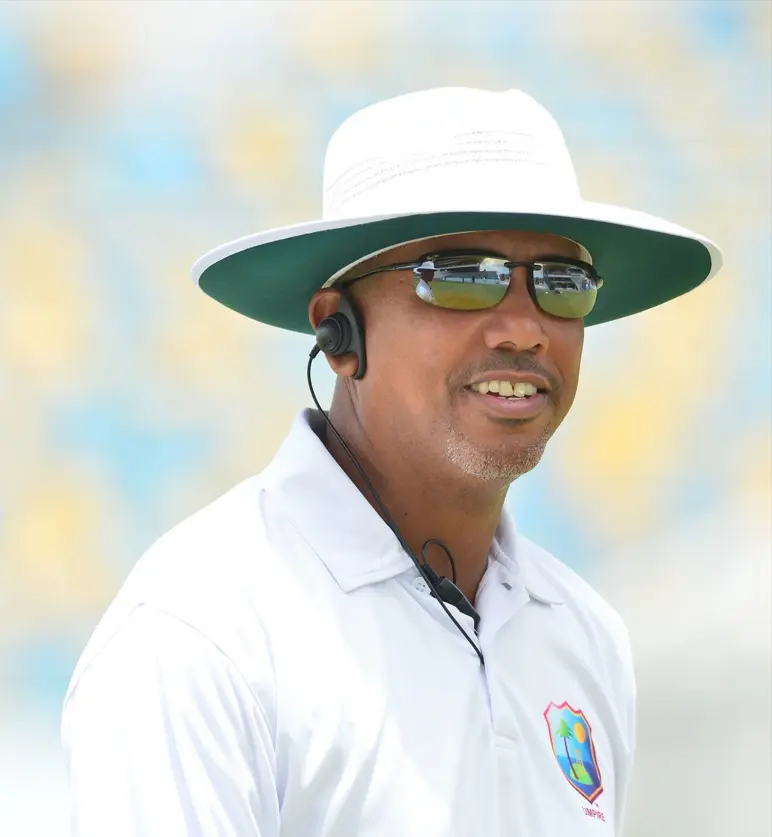Now Reading: Joel Wilson: Umpiring highs and controversies
-
01
Joel Wilson: Umpiring highs and controversies
Joel Wilson: Umpiring highs and controversies

Joel Wilson is a name that many Australian cricket fans know and sometimes disagree with. He has had a fantastic but rocky career as an international cricket umpire. Wilson’s career has been one of dramatic highs and choices that have sparked a lot of debate. He has gone from calling games in Caribbean club grounds to standing in high-stakes World Cup matches.
In this article, we look at Joel Wilson’s career, his important milestones in Australian cricket, his ICC Elite Panel status and why his reputation as an umpire has caused so much controversy in Australia.
Who is Joel Wilson?
Joel Sheldon Wilson was born in Trinidad & Tobago on December 30, 1966. He started off as a local cricketer and then moved on to umpiring. This road finally brought him to the International Cricket Council’s Elite Panel, which is the highest level of cricket officiating in the world.
How Joel Wilson moved up the ranks
Wilson made his maiden appearance on the world stage in 2011 when he umpired his first One Day International (ODI) match. He slowly became more well-known over the next several years and was given Test and T20I duties. His calm presence and excellent match awareness made him stand out in a field full of competition.
Important events in his early career:
- First ODI: 2011
- First T20 International: 2012
- First Test Match: 2015
By 2019, Joel Wilson’s steady work had earned him a spot on the ICC Elite Panel of Umpires, which is in charge of officiating the most important matches in the world.
Joel Wilson and Australia: a rocky relationship
While Wilson has officiated matches involving almost every cricketing nation, his relationship with Australian cricket fans has been notably strained. Several controversial decisions, especially in high-profile series like the Ashes, have led to frustration and social media uproar across the country.
The 2019 Ashes drama
Wilson made many bad choices in the first test of the 2019 Ashes series at Edgbaston. Most importantly, the Decision Review System (DRS) was able to change two of his judgements, including a blatant LBW against Steve Smith.
Australian fans quickly reacted with memes, tweets and cricket forums poking fun at Wilson’s choices. One line that went viral sums up the mood:
“When Joel Wilson gives you out, all you have to do is review it.”
The Galle howler in 2022
Wilson was again in trouble during the second test between Australia and Sri Lanka at Galle. He wrongly said Usman Khawaja was not out, even though replays revealed a distinct edge. Michael Clarke, a famous Australian cricketer, said it was “one of the worst umpiring decisions” he had ever seen.
These events made Wilson’s reputation in Australia as a skilled but unreliable umpire who makes mistakes when he’s under stress.
World Cup appearances and high-profile duties
Even when people didn’t like him, they always trusted Wilson with important international tasks. He was the referee for many ICC World Cups, such as
- The 2015 Cricket World Cup was held in Australia and New Zealand.
- The 2019 Cricket World Cup will be in England.
- He was a TV umpire for the semi-final between India and New Zealand at the 2023 Cricket World Cup.
His presence on these high-profile missions shows that the ICC has always had faith in his skills, even though fans and players have been criticising him more and more.
Joel Wilson’s statistics at a glance
| Format | Matches | Year |
|---|---|---|
| Tests | 47 | 2015 |
| ODIs | 98 | 2011 |
| T20Is | 50 | 2012 |
Why Joel Wilson was removed from the ICC Elite Panel
The ICC officially kicked Joel Wilson off its Elite Panel in March 2025. Reports say the decision was made due to concerns about his ability to make correct calls and the increased DRS overturn rate.
Wilson had the highest DRS overturn rate of all elite umpires in 2024, at 35%. This suggests that more than a third of his decisions were changed after a review, which raises doubts about his judgement and consistency.
The Australian media quickly picked up on this news:
“Wilson’s stats were terrible and a lot of Australian fans think it’s about time he was let go.”
Many people in the cricket world, notably in Australia, thought this decision was important to keep the quality of officiating up at the international level.
The human side of umpiring
It’s crucial to remember that being an umpire at the highest level is quite hard. Even the most seasoned officials can feel overwhelmed by the stress, intensity and need to make split-second decisions.
Everyone agrees that Wilson was professional and calm and his coworkers and athletes admired him for it. Despite his mistakes, Wilson faithfully served the game for over a decade.
What’s next for Joel Wilson?
Joel Wilson is no longer on the Elite Panel; however, he may still be seen in international or regional roles. The ICC often lets former top umpires stay involved in domestic leagues, broadcast umpiring or development programmes.
He may also have to coach or train others in the future, notably umpires in the Caribbean, where his path originally began.
The legacy of Joel Wilson in Australian cricket
Australian cricket fans have mixed feelings about Joel Wilson’s legacy.
- On the one hand, he played in many significant matches and helped cricket grow over the world.
- On the other hand, his big mistakes, especially in Aussie Tests, stuck with people.
His experience is a reminder that even the best experts make mistakes. Systems like DRS are there not only for players but also to hold umpires accountable and keep the game fair.
Conclusion
The narrative of Joel Wilson shows the good and bad sides of being a cricket umpire nowadays. His journey has been everything but normal, from standing on the field during World Cup semifinals to being the target of internet memes and heated debates in Australian pubs.



























